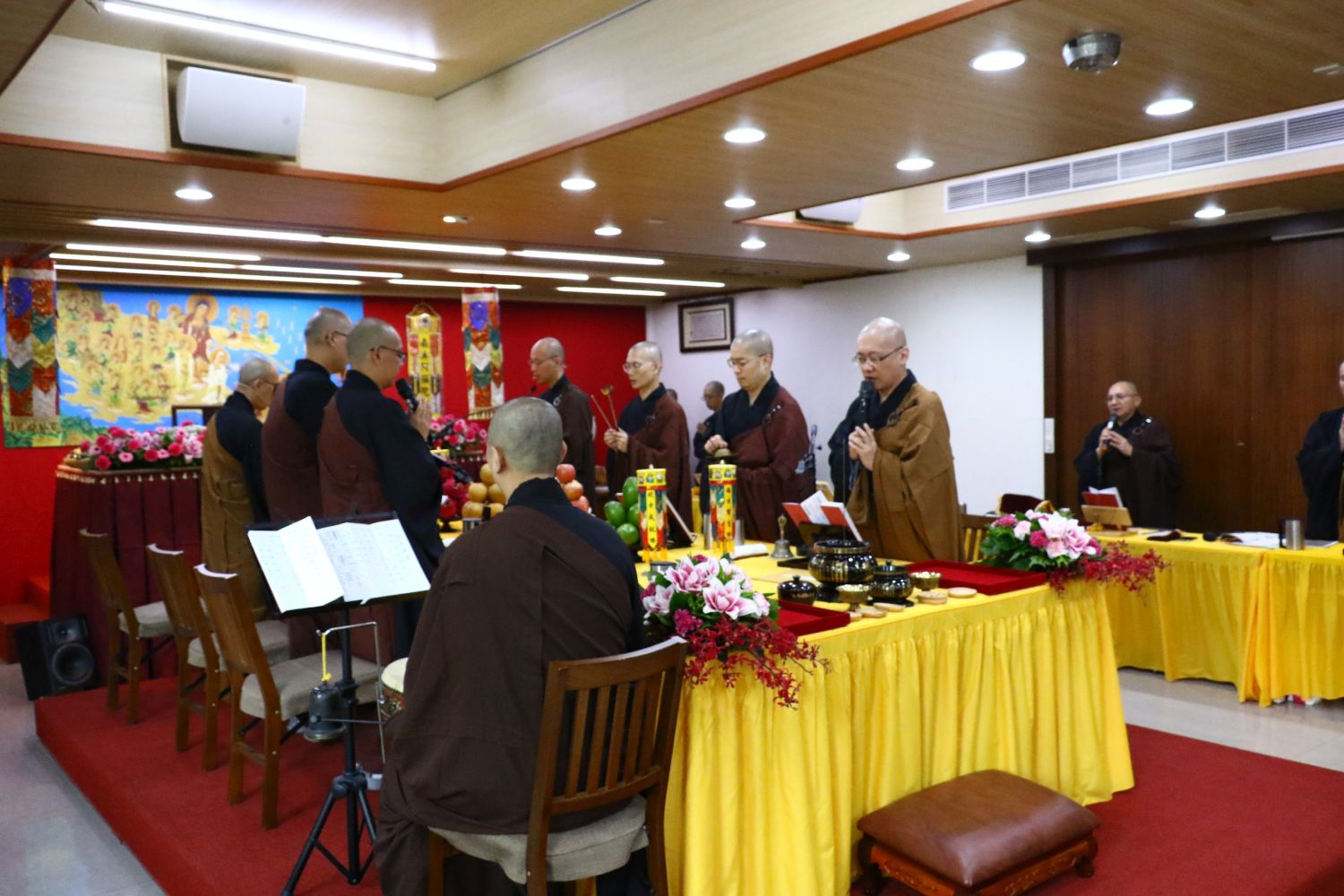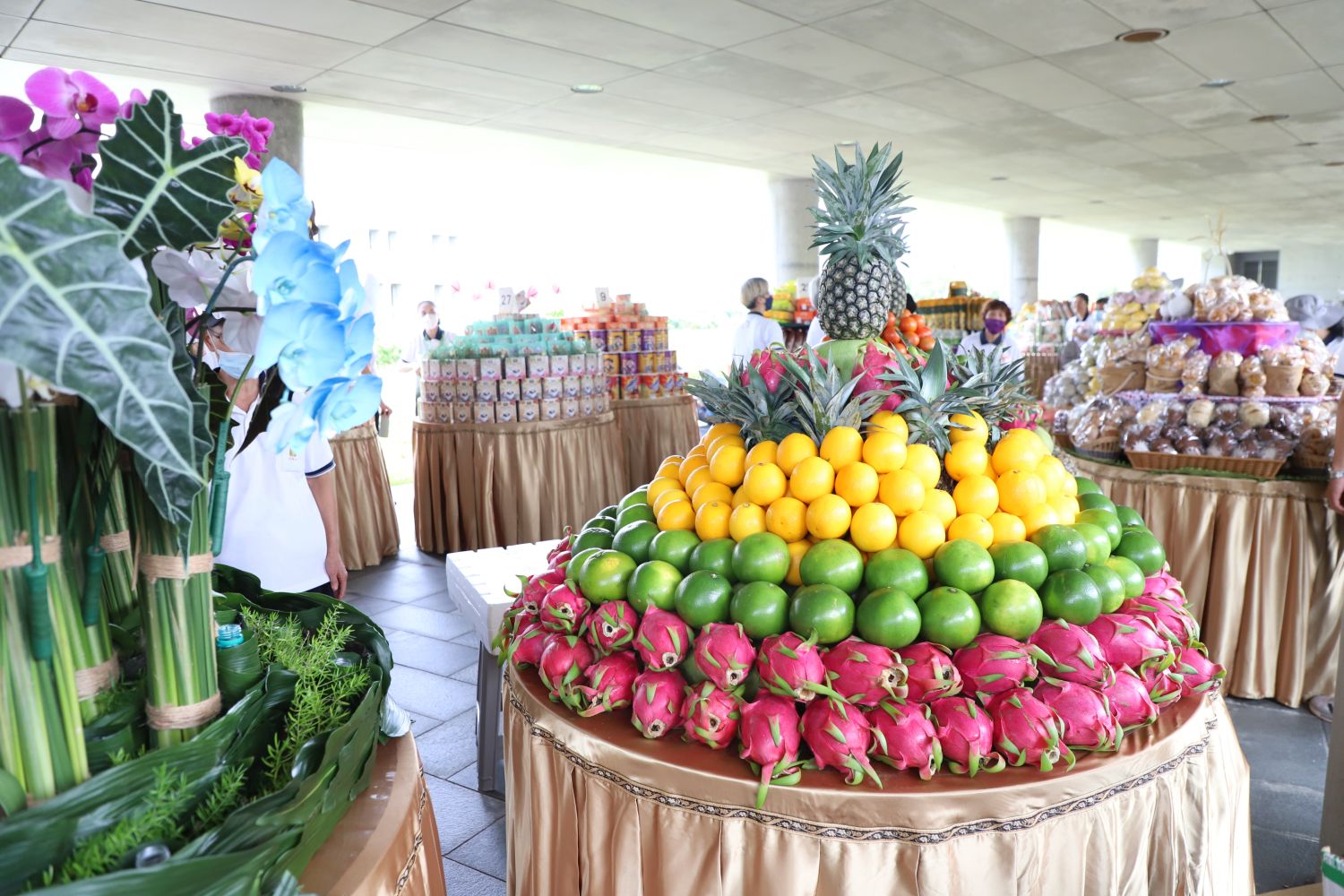Special Topics
The Seventh Lunar Month Dharma Assemblies (I): The Ullambana Assembly – Repay Our Parents' Kindness with Merit Transfer
 In Chinese Buddhism, the "Ullambana Festival (Yulanpen Festival)" is a Buddhist Dharma assembly which is based on the "Buddha Speaks the Ullambana Sutra". It is held on the 15th of the seventh lunar month every year, in order to show gratitude for the kindness exerted by our parents while raising us, as well as to deliver our ancestors from suffering. "Yulanpen" is the Chinese transliteration of the Sanskrit word "Ullambana", which means filial piety, making offerings, repaying kindness, liberating being hung upside down and liberation from suffering. If our parents from past lives are suffering in the realm of hungry ghosts, we can prepare all kinds of food and drink to offer to the Triple Gem, thereby using the merit to save them from the suffering of being hung upside down, hunger and thirst.
In Chinese Buddhism, the "Ullambana Festival (Yulanpen Festival)" is a Buddhist Dharma assembly which is based on the "Buddha Speaks the Ullambana Sutra". It is held on the 15th of the seventh lunar month every year, in order to show gratitude for the kindness exerted by our parents while raising us, as well as to deliver our ancestors from suffering. "Yulanpen" is the Chinese transliteration of the Sanskrit word "Ullambana", which means filial piety, making offerings, repaying kindness, liberating being hung upside down and liberation from suffering. If our parents from past lives are suffering in the realm of hungry ghosts, we can prepare all kinds of food and drink to offer to the Triple Gem, thereby using the merit to save them from the suffering of being hung upside down, hunger and thirst.Origins
According to the "Buddha Speaks the Ullambana Sutra", after the Buddha's great disciple Maudgalyayana attained supernatural powers, he wanted to save his parents from karmic retribution in order to repay their kindness for raising him. Therefore, he used his clairvoyance to search everywhere, and saw that his mother had fallen into the realm of hungry ghosts, as skinny as a twig and unable to eat or drink. Maudgalyayana then immediately filled a bowl with rice and used his supernatural powers to allow his mother to eat. However, the food turned into charcoal and flames before it reached her mouth, due to his mother's karmic retribution. In order to save his mother from this suffering, Maudgalyayana asked the Buddha for a way to deliver her.
 The Buddha told Maudgalyayana that his mother's negative karma was too strong to be eliminated by Maudgalyayana's supernatural power alone. Furthermore, the Buddha instructed him to offer hundreds of flavors of food and drink to the monks of the ten directions on the fifteenth of the seventh lunar month, the day on which the monks completed their summer retreat. Relying on the power of the monks' practice and the merit of offering to the Sangha, Maudgalyayana could save his parents of this present life and past seven lifetimes, as well as save the six kinds of relatives from the suffering of the three lower realms.
The Buddha told Maudgalyayana that his mother's negative karma was too strong to be eliminated by Maudgalyayana's supernatural power alone. Furthermore, the Buddha instructed him to offer hundreds of flavors of food and drink to the monks of the ten directions on the fifteenth of the seventh lunar month, the day on which the monks completed their summer retreat. Relying on the power of the monks' practice and the merit of offering to the Sangha, Maudgalyayana could save his parents of this present life and past seven lifetimes, as well as save the six kinds of relatives from the suffering of the three lower realms.Maudgalyayana did as the Buddha instructed and thus really saved his mother from the suffering of the realm of hungry ghosts. Maudgalyayana asked the Buddha: if, in the future, Buddhist disciples want to practice filial piety, could they also make Ullambana offerings to deliver their current parents and even parents from past seven lifetimes? The Buddha replied: "For the sake of their current parents, as well as their parents of past seven lifetimes, all those who wish to practice compassionate filial piety should offer hundreds of flavors of food and drink to the Pravarana monks of the ten directions on the fifteenth of the seventh lunar month, also known as the Buddha's joyful day and the day of the Sangha's Pravarana. They must pray that their present parents can live to one hundred years old, without illness, sufferings, afflictions, nor worries. In addition, they must pray that their parents from past seven lifetimes can be liberated from the sufferings of the hungry ghost realm, and be reborn as human or celestial beings, thereby enjoying limitless blessings and bliss."
According to the records in the "Complete Chronicles of the Buddha and Patriarchs", Emperor Wu of the Liang Dynasty established the Ullambana Assembly based on the "Buddha Speaks the Ullambana Sutra". Thanks to Emperor Wu's strong advocacy of the Ullambana Assembly, people from all walks of life followed suit. By Tang Dynasty, not only did people value the Ullambana Assembly, but it also became very grand in scale. By the time of the Song Dynasty, the Ullambana Assembly had become one of the most important annual Dharma assemblies in temples.
Content of the Ritual
The main rituals of the Ullambana Assembly can be divided into three parts: purifying the altar by circumambulating the sutra, making the Ullambana Offering, and giving food to the monks. Purifying the altar by circumambulating the sutra means purifying the altar while reciting the "Buddha Speaks the Ullambana Sutra". The Ullambana Assembly is mainly focused on making offerings to the Sangha. To make offerings to the Sangha is equivalent as making offerings to the Buddha. Usually after the Ullambana Assembly, there will be a Yogacara Ulka-mukha Dharma Service*. The Yogacara Ulka-mukha Dharma Service is usually held at dusk or at night when it's time for ghosts to eat. Generally speaking, the service takes at least four hours or more to complete. During the Yogacara Ulka-mukha Dharma Service, twelve evocation texts will be recited to invite twelve types of ghosts. After inviting them over with these texts, they are sprinkled with nectar and given food and drink. Relying on the merit of monks' practice and making offerings to the Sangha, hungry ghosts can be saved through the Yogacara Ulka-mukha Dharma Service.
* "Flaming Mouth" ("Ulka-mukha") is the name of a ghost king in the hungry ghost realm. This name is derived from its appearance. In "Yogacara Flaming Mouth Food Offering Essentials", Flaming Mouth is described as follows: with a large belly, very ugly, smoke coming out of its head, its throat as thin as a needle, constantly spitting out flames from its mouth. Because it spits fire from its mouth, this kind of hungry ghosts is called "Flaming Mouth".
During the ceremony proceedings, no eating or drinking is allowed, not even drinking water. This is out of compassion for beings in the hungry ghost realm, who suffer desperately from hunger and deprivation. These beings cannot find anything to eat and drink all day long. When they do find food, either the food immediately turns into fire, or their throats are too narrow to swallow it. Eating or drinking during the ceremony proceedings will not only provoke the anger of the hungry ghosts, but will also compromise the meaning of compassion conveyed by the Yogacara Ulka-mukha Dharma Service. In addition to providing food to relieve the hunger of hungry ghosts, the most important thing is to give them Buddhist teachings, help them take refuge, and transmit precepts to them, so that they can adopt correct views and will no longer commit sins and suffer, thereby helping them leave the suffering realm as soon as possible and attain bodhi.
The main purpose of the Ullambana Assembly is to repay the kindness of parents. In the "Buddha Speaks the Ullambana Sutra", the Buddha said to Maudgalyayana: "The Buddha's disciples who practice filial piety should, thought after thought, always remember their current parents and even make offerings to their parents of seven past lives. Every year on the fifteenth of the seventh lunar month, they should constantly recall their current parents and even their parents of past seven lifetimes with compassionate filial piety, making Ullambana offerings to the Buddha and the Sangha. In doing so, they repay the loving kindness of the parents who raised and nourished them. All Buddha's disciples should uphold this Dharma." The Ullambana Assembly combines the Buddhist concept of giving with the Chinese spirit of filial piety, extending compassion to parents of past seven lifetimes and even all sentient beings.
Related articles:
Deliverance Service Benefits Both the Living and the Deceased
The Seventh Lunar Month Dharma Assemblies (I): The Ullambana Assembly – Repay Our Parents' Kindness with Merit Transfer
Dharma Assemblies in Lunar July (II): Yogacara Ulka-mukha Dharma Service to Save Hungry Ghosts from Suffering
Dharma Assemblies in Lunar July (III): Practicing Repentance at Emperor Liang’s Repentance Eliminates Delusion, Karma, and Suffering
Q1: Where will our relatives go after death? If they are already reborn, would our prayers for the deceased help them?
Q2: Is it necessary to participate in Dharma assemblies if they are not performed for the deliverance of a deceased relative?
Q3: Why does Buddhism maintain that care and concern for the deceased can be conveyed through Dharma assemblies?
Q4: If we are unable to attend a Dharma assembly at a temple or monastery, can we, alternatively, perform the deliverance ritual at home for our deceased relatives or friends?
Q5: How do we go about dedicating the merit? Can our deceased relatives actually receive the merit that is being dedicated?
Resource: Issue 240 of Humanity Magazine, Dharma Drum Publishing Corporation
Translation: Anne Yeow (姚麗萍)
Editing: Keith Brown, YKL
